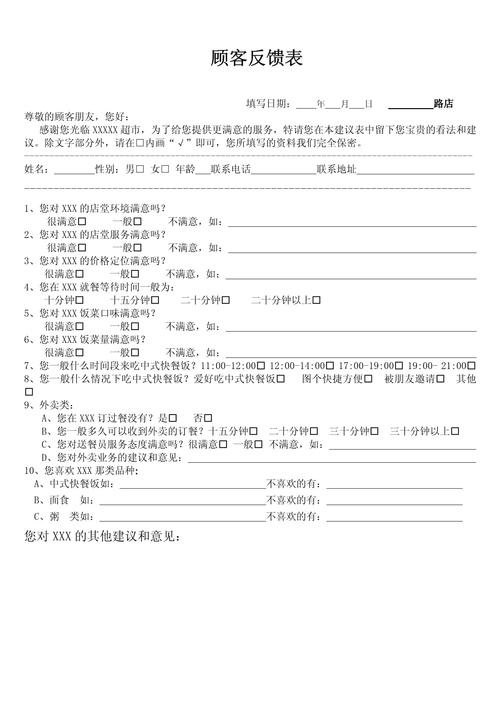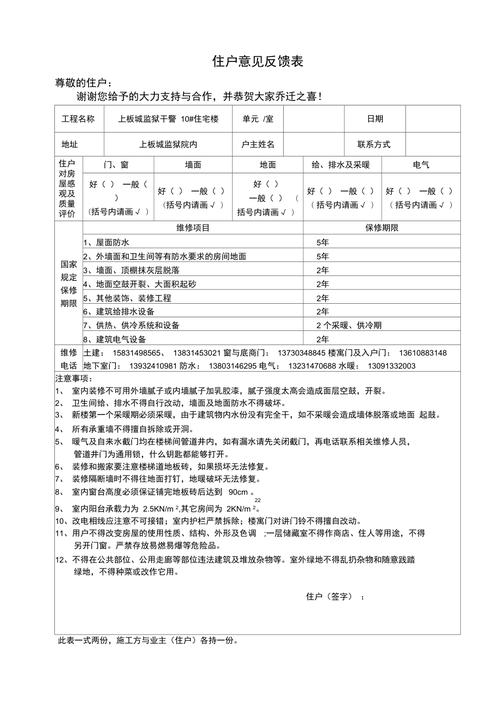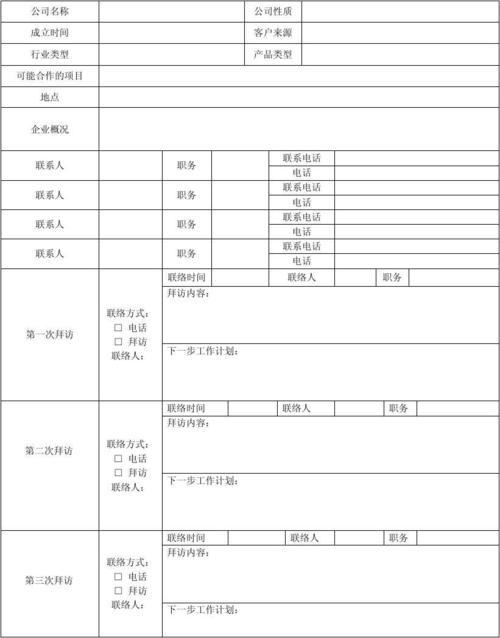【酒店名称】顾客意见反馈表
尊敬的宾客:

您好!
衷心感谢您选择并下榻 【酒店名称】,为了不断提升我们的服务质量,为您带来更卓越的住宿体验,我们诚挚地邀请您花费几分钟时间填写这份反馈表,您的每一条意见和建议都是我们前进的动力。
祝您旅途愉快!
第一部分:基本信息
- 您的姓名(选填): _____
- 您的联系方式(选填,用于回访或致谢): _____
- 您的入住日期: __年__月__日 至 __年__月__日
- 您的预订渠道:
- [ ] 酒店官方网站/App
- [ ] 在线旅行社 (如携程、飞猪、Booking.com等)
- [ ] 公司协议价
- [ ] 直接到店
- [ ] 其他:_____
- 本次入住目的:
- [ ] 商务出行
- [ ] 休闲度假
- [ ] 会议/团队活动
- [ ] 探亲访友
- [ ] 其他:_____
第二部分:综合评价
请根据您的实际体验,对以下各项进行评分。(5分为非常满意,1分为非常不满意)

| 评价项目 | 非常不满意 (1分) | 不满意 (2分) | 一般 (3分) | 满意 (4分) | 非常满意 (5分) |
|---|---|---|---|---|---|
| 总体满意度 | ☐ | ☐ | ☐ | ☐ | ☐ |
| 性价比 | ☐ | ☐ | ☐ | ☐ | ☐ |
| 再次入住意愿 | ☐ | ☐ | ☐ | ☐ | ☐ |
| 向他人推荐意愿 | ☐ | ☐ | ☐ | ☐ | ☐ |
第三部分:分项评价
请对您体验到的具体服务项目进行评价。
A. 预订与入住流程 | 评价项目 | 不满意 (1-2分) | 一般 (3分) | 满意 (4-5分) | 具体说明/建议 | | :--- | :---: | :---: | :---: | :--- | | 预订过程的便捷性 | ☐ | ☐ | ☐ | | | 前台员工服务态度与效率 | ☐ | ☐ | ☐ | | | 入住/退房手续的办理速度 | ☐ | ☐ | ☐ | | | 行李服务的及时性 | ☐ | ☐ | ☐ | |
B. 客房设施与服务 | 评价项目 | 不满意 (1-2分) | 一般 (3分) | 满意 (4-5分) | 具体说明/建议 | | :--- | :---: | :---: | :---: | :--- | | 客房清洁度 | ☐ | ☐ | ☐ | | | 床品舒适度 | ☐ | ☐ | ☐ | | | 房间设施(空调、电视、网络等)的完好性 | ☐ | ☐ | ☐ | | | 客房用品(洗漱用品、毛巾等)的品质 | ☐ | ☐ | ☐ | | | 客房安静度与隔音效果 | ☐ | ☐ | ☐ | | | 客房服务的响应速度(如加床、送物等) | ☐ | ☐ | ☐ | |
C. 餐饮服务 | 评价项目 | 不满意 (1-2分) | 一般 (3分) | 满意 (4-5分) | 具体说明/建议 | | :--- | :---: | :---: | :---: | :--- | | 酒店餐厅(如适用)的菜品口味与质量 | ☐ | ☐ | ☐ | | | 餐厅员工服务态度 | ☐ | ☐ | ☐ | | | 餐厅环境与卫生 | ☐ | ☐ | ☐ | | | 送餐服务的速度与品质 | ☐ | ☐ | ☐ | | | 酒吧/大堂吧的氛围与饮品 | ☐ | ☐ | ☐ | |

D. 其他公共设施与服务 | 评价项目 | 不满意 (1-2分) | 一般 (3分) | 满意 (4-5分) | 具体说明/建议 | | :--- | :---: | :---: | :---: | :--- | | 健身房/游泳池的设施与清洁度 | ☐ | ☐ | ☐ | | | 商务中心服务 | ☐ | ☐ | ☐ | | | 停车服务的便利性 | ☐ | ☐ | ☐ | | | 酒店整体环境与设计 | ☐ | ☐ | ☐ | |
E. 员工服务 | 评价项目 | 不满意 (1-2分) | 一般 (3分) | 满意 (4-5分) | 具体说明/建议 | | :--- | :---: | :---: | :---: | :--- | | 全体员工的友好度与微笑服务 | ☐ | ☐ | ☐ | | | 员工解决问题的能力 | ☐ | ☐ | ☐ | | | 员工对本地信息的了解(如问询、指引) | ☐ | ☐ | ☐ | |
第四部分:开放性问题
您的宝贵意见是我们改进的关键。
-
在本次入住体验中,您最满意的一项服务或设施是什么?为什么?
-
在本次入住体验中,您认为最需要改进的一项是什么?您有什么具体的建议?
-
您有任何其他意见或建议想要告诉我们吗?
第五部分:结束语
再次感谢您抽出宝贵时间填写此表!您的反馈对我们至关重要,我们将认真对待每一条意见,持续努力,力求为您提供更完美的服务。
期待您的再次光临!
【酒店名称】 敬上 【日期】




